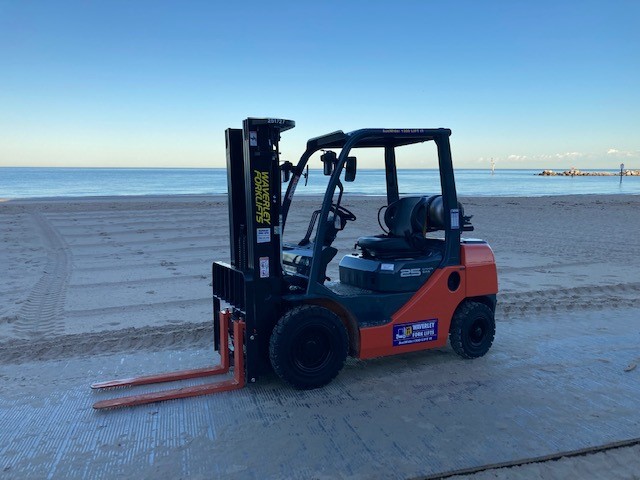In today’s fast-paced industrial landscape, efficiency is key to maintaining a competitive edge. For warehouses, the ability to move goods quickly and safely is paramount, and this is where forklifts come into play.
These powerful machines are not merely a convenience; they are essential tools that streamline warehouse operations, enhance productivity, and ensure safety. In this blog post, we’ll explore the various ways forklift hire contributes to effective warehouse management.
1. Enhanced Efficiency and Productivity
One of the most significant advantages of using forklifts in warehouse operations is the boost in efficiency and productivity they provide. Forklifts allow for the rapid movement of goods, reducing the time required for loading and unloading.
Unlike manual handling, which can be slow and labour-intensive, forklifts can lift heavy loads in a matter of seconds, enabling workers to focus on other essential tasks. This increase in operational speed not only accelerates the supply chain but also ensures that products are delivered to customers promptly, enhancing overall satisfaction.
2. Improved Safety Standards
Safety is a critical concern in any warehouse environment, especially when dealing with heavy machinery and large inventories. Forklifts are designed with safety features that minimise the risk of accidents, such as stability systems, load limiters, and emergency stop buttons.
Additionally, trained operators are equipped with knowledge about safe loading techniques and hazard awareness. By reducing the need for manual lifting and handling, forklifts Perth help prevent injuries related to musculoskeletal disorders and accidents, ultimately creating a safer workplace for all employees.

3. Versatility Across Applications
Forklifts come in various types and sizes, each suited for different tasks and environments. From electric forklifts ideal for indoor use to rough terrain forklifts designed for outdoor operations, these machines can adapt to a wide range of warehousing needs.
Whether it’s stacking pallets high in a narrow aisle or moving bulky items across a large loading dock, forklifts offer versatility that manual labour simply cannot match. This adaptability allows warehouses to optimise their space and streamline operations effectively.
4. Space Optimisation
In a warehouse, space is often at a premium. Forklifts facilitate the efficient use of vertical and horizontal space, allowing for high-density storage solutions. By stacking pallets and goods at varying heights, warehouses can increase their storage capacity significantly without expanding the physical footprint of the facility.
This strategic use of space not only maximises storage but also enhances the overall workflow, making it easier to locate and retrieve items when needed.
5. Cost-Effectiveness
While the initial investment in forklift hire may seem substantial, the long-term benefits far outweigh the costs. The efficiency gained from using forklifts translates into reduced labour costs, as fewer workers are needed to handle heavy loads.
Moreover, faster processing times can lead to increased sales and improved cash flow. Additionally, the safety improvements brought about by using forklifts can reduce insurance premiums and decrease the costs associated with workplace injuries and downtime.
6. Integration with Warehouse Management Systems
Modern warehouses are increasingly utilising technology to streamline operations, and forklifts are no exception. Many forklifts can now be integrated with Warehouse Management Systems (WMS) and other automated systems.
This integration allows for real-time tracking of inventory, improved order accuracy, and better coordination of logistics. For example, forklifts equipped with barcode scanners can quickly and accurately locate items, reducing the chances of errors during picking and shipping. This seamless integration ensures that the entire warehouse operates as a cohesive unit, enhancing overall efficiency.
7. Environmental Considerations
As businesses become more conscious of their environmental impact, electric forklifts are gaining popularity due to their lower emissions and energy efficiency. Many modern forklifts Perth are designed with eco-friendly features, such as regenerative braking and energy-efficient motors.
By investing in these machines, warehouses can reduce their carbon footprint while maintaining high operational standards.
Final Thoughts
In conclusion, forklifts are indispensable assets in streamlining warehouse operations. They enhance efficiency, improve safety, and provide versatility across various applications. The ability to optimise space and integrate with modern technology further cements their role in effective warehouse management.
For businesses looking to improve their logistics and supply chain processes, investing in forklifts is not just a choice; it’s a strategic necessity. By leveraging the benefits of these machines, warehouses can position themselves for greater success in an increasingly competitive market.
Whether you’re running a small warehouse or managing a large distribution centre, understanding the importance of forklift hire can help you make informed decisions that will lead to a more productive and efficient operation.



